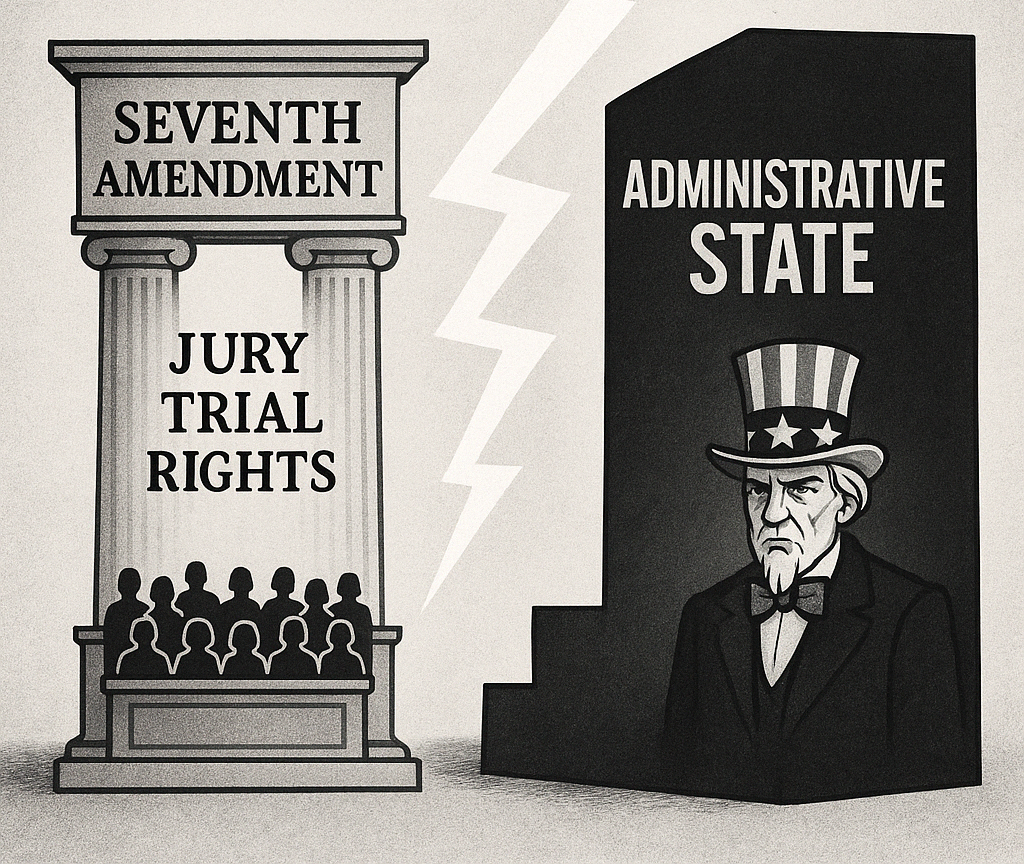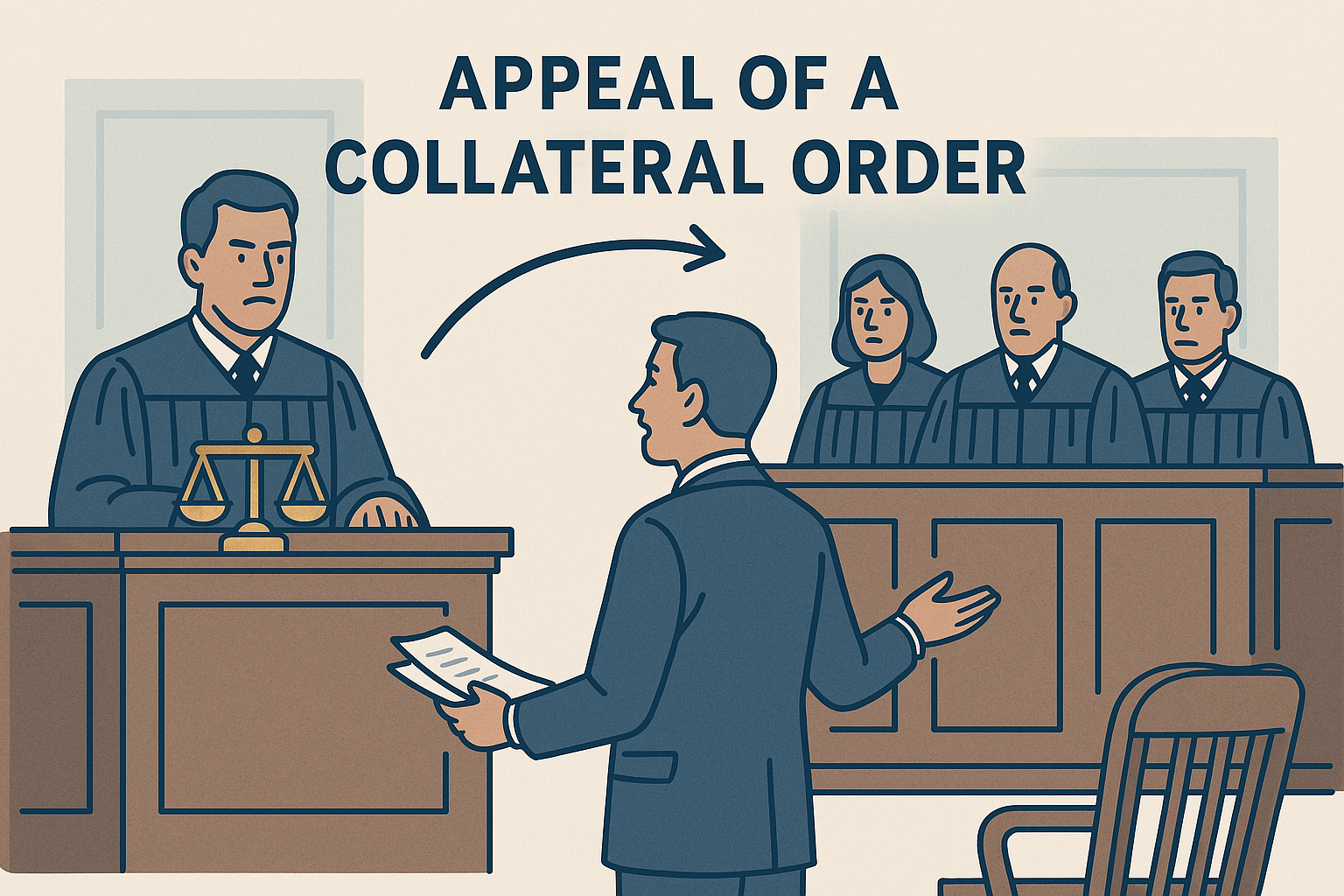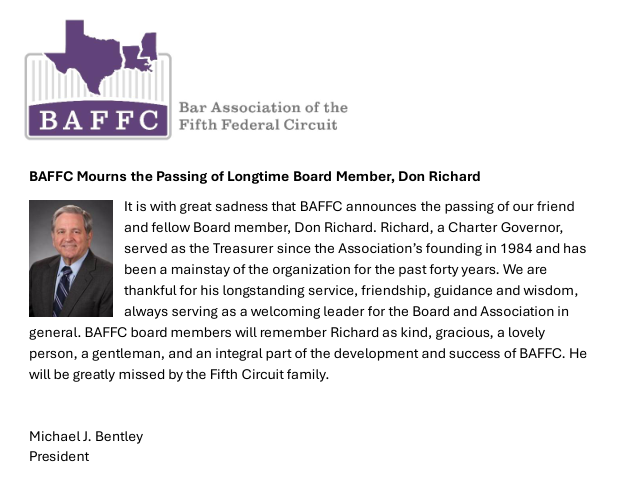 “Grafting ‘manifest disregard of the law’ as a basis for a losing party at arbitration to prevail under § 10(a)(4) would risk tension with Hall Street—and would run headlong into Oxford Health—by forcing us to conduct a less deferential review of a panel’s award than the FAA contemplates. Indeed, adopting [Appellant’s] reading essentially would rewrite the question a judge must ask from ‘whether the arbitrators construed the contract at all’ to ‘whether they construed it correctly.'” No. 24-10833 (Apr. 28, 2025).
“Grafting ‘manifest disregard of the law’ as a basis for a losing party at arbitration to prevail under § 10(a)(4) would risk tension with Hall Street—and would run headlong into Oxford Health—by forcing us to conduct a less deferential review of a panel’s award than the FAA contemplates. Indeed, adopting [Appellant’s] reading essentially would rewrite the question a judge must ask from ‘whether the arbitrators construed the contract at all’ to ‘whether they construed it correctly.'” No. 24-10833 (Apr. 28, 2025).
Monthly Archives: April 2025
 Providing a counterpoint to another recent case about contractual conditions, in UniWell Labs v. Frain Indus., the Fifth Circuit an invoice that detailed payment terms and said that “[l]ead time is 10 weeks from receipt of deposit payment, signed lease agreement[,] and testing materials ….”
Providing a counterpoint to another recent case about contractual conditions, in UniWell Labs v. Frain Indus., the Fifth Circuit an invoice that detailed payment terms and said that “[l]ead time is 10 weeks from receipt of deposit payment, signed lease agreement[,] and testing materials ….”
Despite UniWell making the required payments, it never signed the lease agreement, even after multiple requests from Frain. Accordingly, “UniWell’s entire breach-of-contract claim against Frain, predicated on the lease agreement, fails because UniWell did not sign any lease agreement. There was thus no enforceable lease agreement between the parties.” No. 24-10204 (Apr. 14, 2025).
In SpaceX v. NLRB, the Fifth Circuit held that the district court did not “effectively deny” SpaceX’s motion for a preliminary injunction (so interlocutory appeal under 28 U.S.C. § 1292(a)(1) was not allowed). The Court noted:
- SpaceX’s alleged harm—having to participate in an administrative teleconference—was not a “serious, perhaps irreparable, consequence,” and cited precedent that “defending charges brought by an agency does not constitute a ‘serious, perhaps irreparable, consequence’”—especially when SpaceX had previously participated in two similar teleconferences.
- SpaceX did not request expedited briefing until April 26, asking for a ruling “no later than May 2, 2024,” despite the motion being fully briefed since February 12, and then noticed its appeal just two days before its self-imposed deadline.
- SpaceX chose to make repeated challenges to a transfer order and requested its reconsideration, which also affected the timing of the injunction proceeding.
No. 24-40315, Mar. 5, 2025
The Fifth Circuit found no abuse of discretion about the appointment of a receiver in SEC v. Barton, emphasizing these aspects of the controlling three-factor test:
- Receivership was “clear[ly] necess[ary] to protect a party’s interest in property” because:
- The investors’ property interests faced threats from the defendant’s continued dissipation of assets, market conditions, and third-party actions (such as liens, lawsuits, and foreclosures).
- The defendant continued to spend investor funds even after the SEC filed its complaint, showing no deterrence from prior legal action.
- The receivership allowed for active management of assets, which included operating businesses and properties requiring ongoing oversight.
- The receivership enabled the court to stay litigation and foreclosure actions, preventing further loss of value to the receivership estate.
- Less drastic remedies, such as a monitorship or asset freeze, were inadequate because:
- These alternatives would still allow the defendant some control over the assets, increasing the risk of further dissipation.
- The district court had already found the defendant in contempt for violating prior requirements, indicating that a monitorship would not be effective.
- The assets required dynamic management, which a freeze or monitorship could not provide.
Nos. 23-11237 & 24-10004 (April 17, 2025).
The issue in Equistar Chemicals, LP v. Indeck Power Equip. Co. was whether the below contract provision, coupled with another provision requiring that all notices be in writing, created a condition precedent of notice to a damages claim under a contract:
The Fifth Circuit held that no condition precedent was created:
[T]here is no conditional language connecting that notice requirement to Equistar’s ability to seek a contractual remedy. Article 8(b) does not use the words “if,” “provided that,” “on the condition that,” “prior to,” or any other similar phrase to create a condition. It also does not limit Equistar’s ability to exercise its contractual remedies. In other words, there is no link between a condition precedent (notice) and a conditioned obligation (suing for breach of warranty or contract).
No. 21-20345 (April 23, 2025).
 I return to Salon today, arguing that rational-basis review presents a serious problem for the current “ad hoc” tariff program. I give a (loud) shout out to the legendary case of St. Joseph Abbey v. Castille, 712 F.3d 215 (5th Cir. 2013), in which a Lousiana regulation that barred monks from making funeral caskets was struck down under rational-basis review.
I return to Salon today, arguing that rational-basis review presents a serious problem for the current “ad hoc” tariff program. I give a (loud) shout out to the legendary case of St. Joseph Abbey v. Castille, 712 F.3d 215 (5th Cir. 2013), in which a Lousiana regulation that barred monks from making funeral caskets was struck down under rational-basis review.
 In the unlikely-named case of 8fig, Inc. v. Stepup Funny, LLC, the Fifth Circuit reaffirmed the presumption in favor of public access to judicial records, emphasizing that “sealing judicial records is … heavily disfavored.” While courts may seal records on a case-by-case, document-by-document, line-by-line basis, the burden rests on the party seeking to keep records sealed to demonstrate specific interests that outweigh the public’s right to access. Here, the parties’ general assertions of privacy and confidentiality, as well as the existence of a settlement agreement, were insufficient to overcome the presumption of openness.
In the unlikely-named case of 8fig, Inc. v. Stepup Funny, LLC, the Fifth Circuit reaffirmed the presumption in favor of public access to judicial records, emphasizing that “sealing judicial records is … heavily disfavored.” While courts may seal records on a case-by-case, document-by-document, line-by-line basis, the burden rests on the party seeking to keep records sealed to demonstrate specific interests that outweigh the public’s right to access. Here, the parties’ general assertions of privacy and confidentiality, as well as the existence of a settlement agreement, were insufficient to overcome the presumption of openness.
The Court noted that even if confidentiality was a factor in reaching settlement, this would only weigh in favor of sealing the settlement terms themselves, not the entire judicial record. Importantly, the Court reminded that “record may not be sealed ‘merely because it could lead to a litigant’s embarrassment.'” No. 23-50890 (Apr. 18, 2025).
 In Allied World Nat’l Assurance Co. v. Nisus Corp., the Fifth Circuit addressed a limitations issue in a products-liability dispute involving damage to fire-protection sprinkler systems. The court held that the claims were time-barred under Louisiana law, which, at the relevant time, imposed a one-year prescriptive period for products-liability actions, and considered “constructive knowledge” to trigger the running of prescription.
In Allied World Nat’l Assurance Co. v. Nisus Corp., the Fifth Circuit addressed a limitations issue in a products-liability dispute involving damage to fire-protection sprinkler systems. The court held that the claims were time-barred under Louisiana law, which, at the relevant time, imposed a one-year prescriptive period for products-liability actions, and considered “constructive knowledge” to trigger the running of prescription.
Here, the agent responsible for property maintenance had constructive knowledge of the cause of the damage well before the one-year period preceding the filing of the lawsuit, and that knowledge was imputed to the principal. The Court rejected arguments that the agent’s inaction or the defendant’s alleged misrepresentations tolled the prescriptive period, finding that a reasonable investigation would have uncovered the relevant information in time. No. 24-30386, Apr. 18, 2025.
 After affirmance of the Fifth Circuit in SEC v. Jarkesy, that Court returned to the interaction between the Seventh Amendment and the admininistrative state in AT&T Inc. v. FCC. The specific issue was whether the FCC’s in-house enforcement procedures for imposing civil penalties violate the constitutional right to a jury trial, as clarified by Jarkesy.
After affirmance of the Fifth Circuit in SEC v. Jarkesy, that Court returned to the interaction between the Seventh Amendment and the admininistrative state in AT&T Inc. v. FCC. The specific issue was whether the FCC’s in-house enforcement procedures for imposing civil penalties violate the constitutional right to a jury trial, as clarified by Jarkesy.
The court held that the FCC’s process ran afoul of the Seventh Amendment, emphasizing that these civil penalties are “the prototypical common law remedy,” designed to punish or deter, and thus “a type of remedy at common law that could only be enforced in courts of law.” In particular, and FCC enforcement action under section 222 of the Telecommunications Act resembles a negligence action, as it centers on whether the carrier took “reasonable measures” to protect customer data, notwithstanding the technical nature of the factual situation.
The Court also rejected the FCC’s argument that the availability of a later trial in federal court—after the agency has already found liability and imposed penalties—satisfies the Seventh Amendment. In such a trial, explained the Court, the defendant cannot challenge the legal conclusions of the agency, only the factual basis, and that this structure forces companies to choose between a jury trial and the ability to challenge the legality of the order. No. 24-60223, Apr. 17, 2025. (A third judge concurred without opinion).
In the case of Wilson v. Kemper Corp. Servcs., the Fifth Circuit held that the district court erred in denying the plaintiff’s motion to remand, because the non-diverse defendant was properly joined.
The Court emphasized that under Mississippi law, the “duty to read” doctrine did not bar the plaintiff’s negligence claim against that defedndant. The Court further explained that the district court’s reliance on Maria Wilson’s affidavit, which admitted her illiteracy and inability to read the policy, was insufficient by itself to establish improper joinder, especially when the policy’s language was ambiguous and did not explicitly require the plainitff to reside in the house to be covered. No. 24-60090, Apr. 11, 2025.
 State of Mississippi v. JXN Water addressed whether an order compelling the disclosure of SNAP recipient data qualifies as an appealable collateral order.
State of Mississippi v. JXN Water addressed whether an order compelling the disclosure of SNAP recipient data qualifies as an appealable collateral order.
Remininding that the requirements for a collateral order are “stingent,” the Fifth Circuit found them satisfied here. The order (1) conclusively determined a disputed question, (2) resolved an important issue separate from the merits of the case, and (3) was functionally unreviewable on appeal from a final judgment. On the last point, the Court emphasized that once the confidential information of SNAP recipients is released, “no relief can make the information confidential again.” No. 24-60309, Apr. 10, 2025
The complaint recently filed by Susman Godfrey in the District of the District of Columbia about a recent executive order is a powerful work of advocacy.
 Zyla Life Sciences v. Wells Pharma of Houston arose when a maker of compounded suppositories accused a competitor of butting into its business. The defense argued that the plaintiff’s state-law claim was preempted. The Fifth Circuit disagreed:
Zyla Life Sciences v. Wells Pharma of Houston arose when a maker of compounded suppositories accused a competitor of butting into its business. The defense argued that the plaintiff’s state-law claim was preempted. The Fifth Circuit disagreed:
The question presented is whether a State triggers implied obstacles-and-purposes preemption when it expressly incorporates federal law into state law. The district court held yes. But as the Supreme Court held almost a century ago, “there is no conflict in terms, and no possibility of such conflict, for the state statute makes federal law its own.”
No. 23-20533, Apr. 10, 2025 (citation omitted).
The hapless plaintiff in Villarreal v. City of Laredo continues to be out of court. After winning in the Supreme Court on the viability of her First Amendment retaliation claim, the Fifth Circuit affirmed dismissal based on qualified immunity.
The majority opinion emphasized that the events in question occurred in 2017, predating a 2019 Supreme Court decision on the topic; as of 2017, the Supreme Court’s precedent held that there was no clearly established right to be free from a retaliatory arrest supported by probable cause.
A concurrence questioned whether qualified immunity should apply when the constitutional right is clear but the remedy is not, suggesting that the rationale for qualified immunity may not hold in cases where officials have ample time to make decisions, as opposed to split-second judgments.
A dissent argued that in light of the Supreme Court’s opinion, remand to the trial court for consideration in the first instance of qualified immunity was appropriate. No. 20-40359, Apr. 8, 2025.
After the Supreme Court said in no uncertain terms that litigation about deportments under the Alien Enemies Act would proceed by habeas in the place of detention, the first lawsuit was filed and this TRO resulted – inevitably headed to the Fifth Circuit.
The Supreme Court’s recent ruling in Trump v. JGG, in addition to clarifying what legal relief is available against use of the Alien Enemies Act, confirmed that venue for those challenges will likely be within the Fifth Circuit: “For ‘core habeas petitions,’ ‘jurisdiction lies in only one district: the district of confinement.’ The detainees are confined in Texas, so venue is improper in the District of Columbia.”
 In DeWolff, Boberg & Associates v. Pethick, the the Fifth Circuit held that the plaintiff’s evidence was insufficient to establish a genuine dispute of material fact about tortious interference. The record cited was an email from an employee requesting a copy of a confidential list before leaving for a competitor, along with “the allegedly suspicious timeline of the prospective clients hiring the [competitor] after [the employee] left DB&A .” This was not enough to prove that he actually possessed or used the list to interfere with DB&A’s business. No. 24-10375, Apr. 3, 2025.
In DeWolff, Boberg & Associates v. Pethick, the the Fifth Circuit held that the plaintiff’s evidence was insufficient to establish a genuine dispute of material fact about tortious interference. The record cited was an email from an employee requesting a copy of a confidential list before leaving for a competitor, along with “the allegedly suspicious timeline of the prospective clients hiring the [competitor] after [the employee] left DB&A .” This was not enough to prove that he actually possessed or used the list to interfere with DB&A’s business. No. 24-10375, Apr. 3, 2025.
 The question whether an administrative agency has unfairly “changed the rules” is central in many challenges to regulations. On April 2, the Supreme Court addressed a particularly hard-fought dispute about that issue in FDA v. Wages & White Lion Investments, LLC, a case about the FDA’s denial of marketing authorization for flavored e-cigarette products.
The question whether an administrative agency has unfairly “changed the rules” is central in many challenges to regulations. On April 2, the Supreme Court addressed a particularly hard-fought dispute about that issue in FDA v. Wages & White Lion Investments, LLC, a case about the FDA’s denial of marketing authorization for flavored e-cigarette products.
The en banc Fifth Circuit held that the FDA acted arbitrarily and capriciously by applying different standards than those stated in its predecisional guidance documents, and by failing to review marketing plans previously deemed critical.
The Supreme Court held that the FDA’s denial orders were consistent with its predecisional guidance about scientific evidence, comparative efficacy, and device type. The Court concluded that the FDA’s guidance documents did not commit to any specific type of study, and that the FDA’s requirement for manufacturers to compare their flavored products to tobacco-flavored products was a natural consequence of its guidance. No. 23-1038 (U.S. Apr. 2, 2025).

